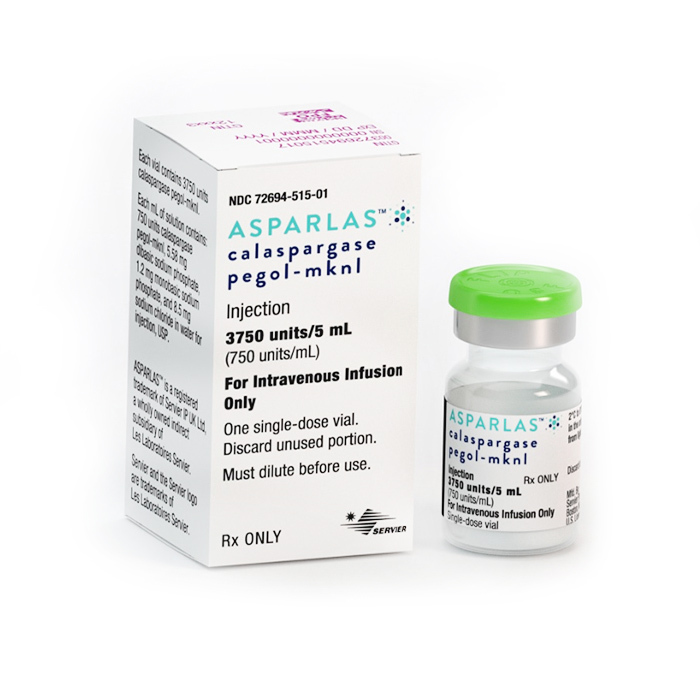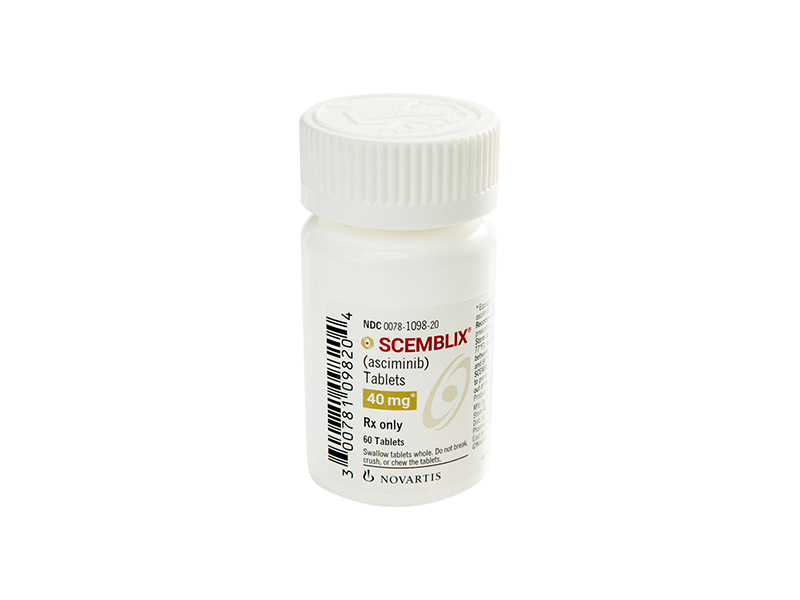Asparlas (calaspargase pegol-mknl) vs Scemblix (asciminib)
Asparlas (calaspargase pegol-mknl) vs Scemblix (asciminib)
Asparlas (calaspargase pegol-mknl) and Scemblix (asciminib) are two different medications used to treat distinct types of blood cancers. Asparlas is a chemotherapeutic agent specifically indicated for the treatment of acute lymphoblastic leukemia (ALL) in pediatric and young adult patients, and it works by depleting the amino acid asparagine, which leukemia cells require to grow. On the other hand, Scemblix is used to treat chronic myeloid leukemia (CML) in adults and functions as a tyrosine kinase inhibitor, targeting the BCR-ABL protein that drives CML cell growth. Patients should consult with their healthcare providers to determine which medication is appropriate for their specific type of leukemia and individual health profile.
Difference between Asparlas and Scemblix
| Metric | Asparlas (calaspargase pegol-mknl) | Scemblix (asciminib) |
|---|---|---|
| Generic name | Calaspargase pegol-mknl | Asciminib |
| Indications | Acute lymphoblastic leukemia (ALL) | Chronic myeloid leukemia (CML) |
| Mechanism of action | Modified enzyme that catalyzes the conversion of L-asparagine to aspartic acid and ammonia, reducing the available L-asparagine which certain leukemia cells are dependent on | Allosteric inhibitor that specifically targets the ABL myristoyl pocket of the BCR-ABL1 protein |
| Brand names | Asparlas | Scemblix |
| Administrative route | Intravenous | Oral |
| Side effects | Elevated liver enzymes, increased bilirubin, pancreatitis, abnormal clotting studies | Nausea, diarrhea, headache, fatigue, muscle pain |
| Contraindications | History of serious hypersensitivity to pegylated L-asparaginase, serious thrombosis with prior L-asparaginase therapy | Hypersensitivity to asciminib, concomitant use with strong CYP3A4 inducers |
| Drug class | Antineoplastic agent, enzyme | Tyrosine kinase inhibitor |
| Manufacturer | Servier Pharmaceuticals | Novartis |
Efficacy
Efficacy of Asparlas (Calaspargase Pegol-mknl) in Leukemia
Asparlas, known generically as calaspargase pegol-mknl, is a medication specifically indicated for the treatment of acute lymphoblastic leukemia (ALL), a type of cancer that affects the blood and bone marrow. Asparlas is an engineered form of the enzyme asparaginase, which depletes the amino acid asparagine. Leukemia cells, particularly those in ALL, require asparagine to grow and multiply. By depleting asparagine, Asparlas effectively starves the leukemia cells, inhibiting their ability to proliferate. Clinical trials have demonstrated that Asparlas, when used as part of a multi-agent chemotherapeutic regimen, is effective in achieving and maintaining remission in pediatric and young adult patients with ALL.
The efficacy of Asparlas was established in a pivotal clinical trial that compared it to native E. coli asparaginase, another form of asparaginase therapy. The results showed that Asparlas maintained asparagine depletion activity levels consistent with therapeutic effect throughout the dosing interval. This prolonged activity allows for less frequent dosing compared to other forms of asparaginase, which can be beneficial in reducing the treatment burden on patients and potentially improving adherence to the therapeutic regimen.
Efficacy of Scemblix (Asciminib) in Leukemia
Scemblix, with the generic name asciminib, is a newer medication approved for the treatment of chronic myeloid leukemia (CML). Scemblix is a kinase inhibitor that targets the ABL myristoyl pocket (STAMP). It is specifically indicated for adult patients with Philadelphia chromosome-positive CML in the chronic phase who have received at least two prior therapies, including a tyrosine kinase inhibitor (TKI). Scemblix works by inhibiting the BCR-ABL1 fusion protein, which is responsible for the uncontrolled proliferation of leukemic cells in CML.
The efficacy of Scemblix was demonstrated in clinical trials where it showed significant effectiveness in patients who were resistant to or intolerant of previous TKI therapies. In these studies, Scemblix achieved notable rates of hematologic and cytogenetic responses, which are critical markers of treatment success in CML. The drug has provided an important treatment option for patients with limited alternatives due to resistance or intolerance to other TKIs. Its unique mechanism of action and its efficacy in heavily pre-treated populations underscore its role as a valuable addition to the CML treatment landscape.
Regulatory Agency Approvals
Asparlas
-
Food and Drug Administration (FDA), USA

Scemblix
-
Food and Drug Administration (FDA), USA

Access Asparlas or Scemblix today
If Asparlas or Scemblix are not approved or available in your country (e.g. due to supply issues), you can access them via Everyone.org.
How it works

Make an enquiry
Choose the medicine you want to buy, answer a couple of questions, and upload your prescription to speed things up. We’ll get back to you within 24 hours.


Make an enquiry
Choose the medicine you want to buy, answer a couple of questions, and upload your prescription to speed things up. We’ll get back to you within 24 hours.


Breeze through the paperwork
We'll guide you through the required documents for importing unapproved medicine, ensuring you have all the necessary information.


Get a personalized quote
We’ll prepare a quote for you, including medicine costs and any shipping, administrative, or import fees that may apply.


Receive your medicine
Accept the quote and we’ll handle the rest - sourcing and safely delivering your medicine.

Some text on this page has been automatically generated. Speak to your physician before you start a new treatment or medication.
Let's talk
If you have any questions, call us or send us a message through WhatsApp or email:
Contact us




